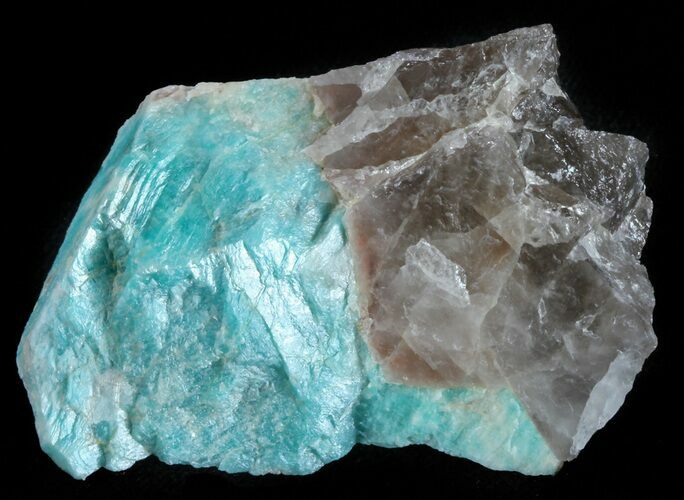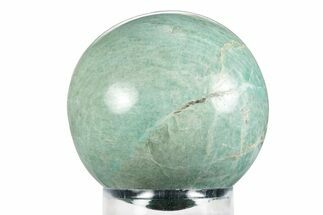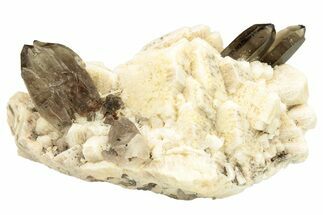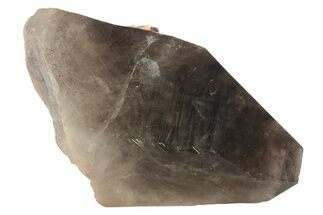This Specimen has been sold.
1.9" Amazonite Crystal with Smoky Quartz - Colorado
This is a lovely, teal blue amazonite crystal mined in Crystal Peak, Colorado. A small amount of smoky quartz can be found in association with the amazonite.
About Amazonite
Amazonite is a green variety of microcline feldspar that is the state mineral of Colorado. It has recently received a lot of attention for its prominence on the reality show “Prospectors”, which follows several groups of Colorado mineral miners. In fact, most of our amazonite is sourced from some of the prospectors on the show. High-quality crystals are found at several locations in Colorado, often in vugs associated with smoky quartz.
Its name comes from the Amazon River, where the mineral was originally thought to be found, though is now doubtful to occur in the region. Its distinct blue-green color was originally thought to be caused by copper content, but it is actually due to very small quantities of lead present in the mineral. The lead is locked away in the crystal structure so it poses no health risk from handling.
Amazonite is a green variety of microcline feldspar that is the state mineral of Colorado. It has recently received a lot of attention for its prominence on the reality show “Prospectors”, which follows several groups of Colorado mineral miners. In fact, most of our amazonite is sourced from some of the prospectors on the show. High-quality crystals are found at several locations in Colorado, often in vugs associated with smoky quartz.
Its name comes from the Amazon River, where the mineral was originally thought to be found, though is now doubtful to occur in the region. Its distinct blue-green color was originally thought to be caused by copper content, but it is actually due to very small quantities of lead present in the mineral. The lead is locked away in the crystal structure so it poses no health risk from handling.
About Quartz
Quartz is the name given to silicon dioxide (SiO2) and is the second most abundant mineral in the Earth's crust. Quartz crystals generally grow in silica-rich environments--usually igneous rocks or hydrothermal environments like geothermal waters--at temperatures between 100°C and 450°C, and usually under very high pressure. In either case, crystals will precipitate as temperatures cool, just as ice gradually forms when water freezes. Quartz veins are formed when open fissures are filled with hot water during the closing stages of mountain formation: these veins can be hundreds of millions of years old.
Quartz is the name given to silicon dioxide (SiO2) and is the second most abundant mineral in the Earth's crust. Quartz crystals generally grow in silica-rich environments--usually igneous rocks or hydrothermal environments like geothermal waters--at temperatures between 100°C and 450°C, and usually under very high pressure. In either case, crystals will precipitate as temperatures cool, just as ice gradually forms when water freezes. Quartz veins are formed when open fissures are filled with hot water during the closing stages of mountain formation: these veins can be hundreds of millions of years old.
Smoky quartz is a grey-brown to black variety of quartz. This common name is derived from the appearance of smoke within the quartz crystal. Depending on the location and the chemicals present during formation, smoky quartz can appear opaque black, but it is typically translucent to some extent. It is believed that the quartz gains this color from a combination of natural irradiation and aluminum impurities.
SPECIES
Microcline var. Amazonite
LOCATION
Crystal Peak, Colorado
SIZE
1.9" wide
CATEGORY
ITEM
#61374
 Reviews
Reviews













